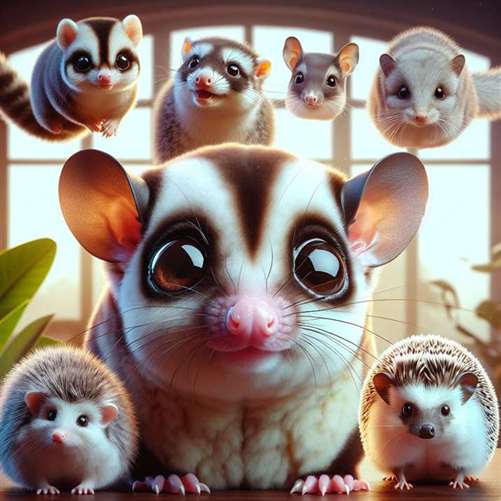Exotic Small Mammal Pets You Can Own
Introduction
Did you know that in recent years, exotic small mammal pets have become one of the fastest-growing segments of pet ownership? As people increasingly seek companionship in smaller, unique forms, the allure of these charming creatures has captured the hearts of many. Today, we’ll dive into the world of exotic small mammal pets, exploring their characteristics, care needs, and the many benefits they bring to their owners.
The trend toward owning exotic pets is not merely a passing fancy; it reflects a shift in lifestyle and preferences among pet owners. With limited living space and busy schedules, more individuals and families are opting for smaller pets that require less space and commitment compared to larger animals. These delightful creatures, ranging from ferrets to hedgehogs, offer companionship without overwhelming responsibilities.
Understanding exotic small mammal pets is crucial for potential pet owners. The pet industry has seen significant growth in this niche market, with studies indicating that consumers are increasingly favoring these unique pets for their character and diverse care needs. As we explore this article, you will learn about the different types of exotic small mammal pets, their care requirements, and the myriad benefits of welcoming them into your home.
Let’s embark on this journey to discover the fascinating world of exotic small mammal pets, starting with a clear definition of what they are. For more information on pet care, check out our guide on proper pet nutrition.
What is Exotic Small Mammal Pets?
Definition
Exotic small mammal pets encompass a variety of small mammals that are not typically found in traditional pet ownership. These can include pets like ferrets, hedgehogs, guinea pigs, rabbits, and hamsters. Each species has unique characteristics, behaviors, and care requirements, making them particularly appealing to pet enthusiasts who are looking for something a bit different.
Historical Context
The history of keeping exotic small mammal pets dates back centuries, but their popularity has surged recently. Initially, many of these animals were kept in the wild or used for specific purposes, such as pest control. Over time, however, they transitioned into beloved household companions. The rise of social media and online communities has played a significant role in this trend, allowing pet owners to share their experiences and educate others about these unique animals.
The Importance of Exotic Small Mammal Pets
With the increasing interest in keeping exotic small mammal pets, it’s important to understand their significance in today’s pet industry. These pets often require specific care, which can be both a challenge and a rewarding experience for owners. The demand for information about how to properly care for these animals has led to a wealth of resources available online and at pet stores.
Exotic Small Mammal Pets in the Context of the Pet Industry
The exotic small mammal pet market has grown exponentially, contributing to the overall dynamics of the pet industry. Unlike traditional pets, these animals often require specialized care, including specific diets, habitats, and socialization. This niche has opened up new avenues for breeders, pet stores, and pet care professionals to provide tailored services and products.
Key Players or Contributors
Several organizations and breeders have emerged to support the growing interest in exotic small mammal pets. For example, breeders specializing in guinea pigs and ferrets have become prominent figures in the industry, ensuring responsible breeding practices and promoting the welfare of these animals. Additionally, online forums and communities have flourished, where pet owners can share insights and advice, further enriching the knowledge base around these unique pets.
For those interested in specific breeds, be sure to explore our list of popular pet choices.

How Does Exotic Small Mammal Pets Work?
The Mechanics of Exotic Small Mammal Pets
Caring for exotic small mammal pets entails understanding their specific needs and behaviors. Each type of small mammal has unique requirements, but there are some commonalities in care practices.
1. Housing and Environment
Creating a suitable living environment is crucial for the health and happiness of your exotic small mammal pets. Here are some essential considerations:
- Space Requirements: Ensure your pet has enough space to move around and explore. For example, ferrets require a multi-level enclosure to accommodate their playful nature, while guinea pigs thrive in larger, horizontal cages.
- Bedding and Accessories: Use appropriate bedding that is safe and comfortable. Avoid cedar or pine shavings as they can be harmful. Instead, choose options like paper-based bedding or aspen shavings. Accessories such as hiding spots, toys, and chew items are also essential.
2. Diet and Nutrition
Feeding your exotic small mammal pets a balanced diet tailored to their species is vital. Many small mammals require specific types of food:
- Guinea Pigs: They need a diet rich in vitamin C, primarily from hay, fresh vegetables, and specially formulated pellets.
- Rabbits: A diet high in fiber from hay, supplemented with fresh veggies and limited pellets, is crucial for their digestive health.
- Ferrets: These carnivores require high-protein diets, often consisting of quality ferret food or raw meat.
3. Socialization and Interaction
Socialization is key to ensuring your exotic small mammal pets are well-adjusted and happy. Most small mammals thrive on interaction with their owners or fellow pets:
- Ferrets are highly social and need regular playtime outside their cage to prevent boredom.
- Guinea pigs are also social animals, so consider adopting them in pairs to keep them company.
- Hedgehogs, while more solitary, still benefit from gentle handling to become accustomed to human interaction.
Common Challenges of Owning Exotic Small Mammal Pets
Owning exotic small mammal pets comes with its own set of challenges. Understanding these can help you prepare for a successful pet ownership experience.
- Health Concerns: These pets may be prone to specific health issues. Regular veterinary check-ups and vaccinations are crucial for early detection and treatment.
- Behavioral Issues: Some small mammals may exhibit behavioral problems if not socialized properly or if they are kept in inadequate environments.
- Lifespan Considerations: Many exotic small mammal pets can live longer than expected; for instance, ferrets can live up to 8 years or more, while rabbits can live over a decade. It’s essential to be prepared for long-term commitment.
For more tips on caring for these adorable companions, take a look at our comprehensive guide to small mammal pet care.
Benefits of Owning Exotic Small Mammal Pets
Owning exotic small mammal pets can be an incredibly rewarding experience. Here are some of the key benefits that come with these unique companions:
1. Companionship
These pets offer a deep sense of companionship. Their playful and curious nature can bring joy and laughter into your home. The bond formed between a pet and its owner can significantly enhance emotional well-being.
2. Low Maintenance
Compared to larger pets, many exotic small mammal pets require less daily maintenance. They often need less space and can be easier to care for, making them ideal for busy individuals or families living in apartments.
3. Educational Value
Owning an exotic small mammal pet can provide a fantastic educational opportunity for children and adults alike. Learning about the care, behavior, and needs of these animals fosters responsibility and respect for all living creatures.
4. Unique Personalities
Each species of exotic small mammal pets has its own unique personality traits. Ferrets are known for their mischievous antics, while guinea pigs are often affectionate and social. Finding the right pet that matches your lifestyle and personality can enhance your living experience.
5. Community Connection
The growing popularity of exotic small mammal pets has led to vibrant communities of pet owners. Engaging with fellow enthusiasts through forums, social media, and local clubs can provide support, advice, and camaraderie.
If you’re considering adding a new member to your family, check out our insights on the best small mammals for kids as well as easy-to-care-for small mammals.
Future Trends in Exotic Small Mammal Pets
The future of exotic small mammal pets looks promising, with several trends emerging in the pet ownership landscape:
1. Increased Awareness and Education
As more people become interested in exotic small mammal pets, there will be a growing demand for educational resources. Information on proper care, health, and behavior will become increasingly accessible, helping owners provide the best possible care
Resource Links:
- texasavian.com: Small Exotic Mammal Species … Rodents: Chinchillas; Degus; Gerbils; Guinea Pigs; Hamsters; Hedgehogs; Mice; Rats; Rabbits; Prairie Dogs. Other Species:.
- avianexoticsvet.com: Finally, he managed to convey to me, in broken English, that the cat wasn’t the problem. He unzipped a small bag to reveal a tiny, unconscious monkey who had …
- pubmed.ncbi.nlm.nih.gov: … animal are better known and may differ profoundly from those of a pet. Dozens of species of small exotic mammals are kept as pets. These pet small-mammal …




0 Comments